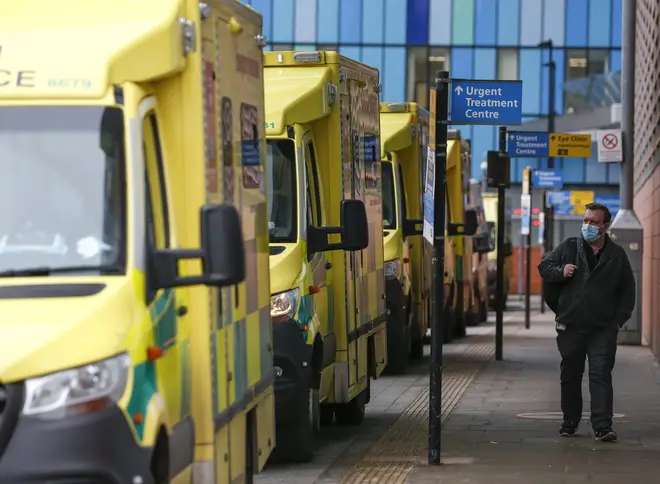
Matthew Wright 7am - 10am
28 January 2021, 00:02 | Updated: 28 January 2021, 06:40

The number of people infected with coronavirus is at the highest level recorded since May, according to a study conducted in England.
The findings of a study, which saw more than 167,600 volunteers tested in England between January 6 and 15, showed that infections remained very high throughout this period with one in 64 people infected.
According to the research, infections in England have flattened but are at the highest level recorded by the React study.
Read more: Boris Johnson insists schools are safe despite reopening delay
There is also an indication of infections declining at the end of the reporting period.
The main findings from the eighth round of the study suggest national prevalence was 1.57%, or 157 per 10,000 people infected.

PM: vaccine effectiveness proof will only become visible in February
It estimated the national R number to be at 0.98 with a range of 0.92 to 1.04.
Regional prevalence was highest in London at 2.83%, while in the South West it was 0.87%.
Prevalence increased nationally in all adult age groups and was highest in 18 to 24-year-olds at 2.44%, while prevalence in the over-65s is 0.93% - almost one in 100.
Read more: Quarantine hotel countries full list - and how the plan will work
Professor Paul Elliott, director of the programme at Imperial, said: "The number of people infected with the virus is at the highest level that we've recorded since we began testing last May.
"We're not seeing the sharp drop in infections that happened under the first lockdown and if infections aren't brought down significantly, hospitals won't be able to cope with the number of people that need critical care.
"We all need to stay at home wherever possible and help bring the virus under control and protect our already over-stretched health system."

PM to set out roadmap out of lockdown in February
It is not yet known whether being vaccinated stops someone from passing the virus on to others.
Prof Elliott said: "I think the suggestion now that there is a decline happening, particularly in some regions may reflect now that the restrictions through lockdown are beginning to have some effect on the prevalence.
He added: "We really do need to keep an eye on what's happening because even though we're seeing this suggestion of a downtick now, which is really good news, it's by no means as fast as we saw in lockdown one
"When we were first in the field in May, there was a rapid decline in prevalence."
The researchers say it will be some time before the impact of vaccination reduces pressures on hospitals.
Steven Riley, professor of infectious disease dynamics at Imperial College London said the Government would have to look at a number of different data sets - including information on hospital admissions and positive Covid-19 tests - in order to get the most reliable expectation of what will happen in the coming weeks.
He added: "We do know the R value at the end of the first lockdown and that was substantially lower than the R values that we're measuring now, which is consistent with the other data."

James reflects on the state of the UK after 100,000 Covid deaths
Prof Elliott said that the study's mobility data - which looks at how much people are moving around - shows that there is more activity now than there was at the end of the first lockdown, but said the lockdown rules are not the same.
He added: "We are definitely heartened by the fact that we're now seeing what looks like a decline in the last week of our survey."
Prof Riley also commented on data from around Christmas, saying the concern was that social mixing would cause a spike in infections, but this was not the case.
He explained: "You would have expected a peak a week to 10 days after that increased mixing, and in our data we don't see evidence of that and it's certainly not in the ONS and some of the other data sources.
"I would note that we have seen substantial increases in infections in the older age groups who are most at risk.
"So, even though there was not an obvious spike in the absolute number, we are seeing considerably higher levels of infection in the most at risk older, so the intergenerational mixing during Christmas may have contributed to that."
The React study from Imperial College London and Ipsos Mori has been conducted every month since May, excluding December.
Health Secretary Matt Hancock said the findings were a "stark reminder" of the need to remain vigilant.
He added: "We must bring infections right down so I urge everyone to play their part to help save lives.
"You must stay at home unless absolutely necessary, follow social distancing rules and minimise contact with others."